

Study at Netherlands ( Nederland/Holland )
Holland is a Liberal, open-minded society with many cultures represented in the population. It has a high-quality education system, with courses and programs recognized around the world.
Student-centered, interactive focus – with teachers and professors known for being very accessible and large number of courses and programs taught in English.
Location and Geography
This small, low-lying country in the northwest of Europe is bordered by Germany, Belgium, and the North Sea. With a total area of 42,437 square kilometers, the Netherlands is comprised mostly of coastal lowland and reclaimed land, with some hills in the southeast. Much of the land is below sea level and is traversed by rivers and canals. The capital is Amsterdam, but the government sits in The Hague (Den Haag).
Society and culture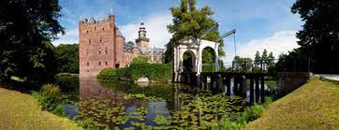
The Dutch are a culturally liberal and tolerant people. Throughout history, Holland has produced many world-renowned artists and architects. In the Dutch Golden Age (roughly 17th century), Dutch trade, art, and science were among the most acclaimed in the world. The Dutch are known for their professionalism, no-nonsense attitude, perfectionism, and the way they separate their business and private lives. They are modern and progressive yet preserve their standards and values. They love the arts and cultural activities. Traditional cuisine in Holland is simple and straightforward.
The Netherlands was a founding member of the
European Union (EU), the Organisation for
Economic Cooperation and Development (OECD), and
the World Trade Organisation (WTO). The modern
Dutch economy is noted for being open, generally
prosperous, heavily dependent upon foreign
trade, an important European transportation hub,
and having a highly mechanised agricultural
industry. The port of Rotterdam is the largest
and most modern port in the world.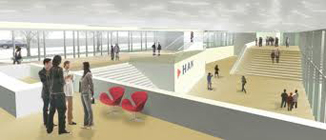
The Netherlands generally has stable industrial relations, moderate unemployment and inflation, and a sizeable current account surplus. The currency is the Euro.
The Netherlands has two constitutions: one for Europe and a federal constitution that applies to the whole of the Netherlands. There is no traditional separation of powers in the Dutch system of government. The Queen and cabinet of the parliament share legislative power. All legislation has to pass through the parliament; the Raad van State (States General) and the Social-Economic Council advise the government on most socio-economic legislation. Twelve provinces form the administrative layer between the national government and the local municipalities.
While the cost of living in the Netherlands is among the lowest in Europe, actual living costs depend on lifestyle and on the city/town of residence. As in most countries, the big cities are more expensive than rural areas. The average total cost of living per month is estimated to be in the range of €750–€1,000, including accommodation €280–€600, food €240, books/stationery €70 and other €270. Bicycles are an extremely popular and cheap form of transport in the Netherlands. Students may be able to obtain discounts on some purchases if they have an international student card.
Costs will also vary according to the type of accommodation, transport, and each student’s financial situation. Types of accommodation available include on-campus; staying with a family or renting/sharing a flat. Higher education tuition fees range from €6,500–€32,000 per year for non-EU international students depending on the course and level of study.
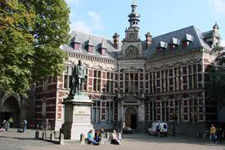
The Ministry of Education, Culture and Science is responsible for education. The Dutch primary and secondary compulsory education system combines a centralised education policy with decentralised administration and management of schools by the municipal authorities and school boards. For post-compulsory vocational education, there are no intermediate levels of management between government and adult/vocational education institutions. Institutions for higher professional education and the universities are fully autonomous.
Higher education is offered at three types of
institutions: universities of applied sciences (hogescholen;
Hoger Beroeps Onderwijs, HBO); research
universities (universiteiten; Wetenschappelijk
Onderwijs, WO); IE institutes (international
education institutes). HBOs comprise general
institutions and institutions specialising in a
particular field and offer a more practically
oriented professional education. The Netherlands
has 40 government-funded universities of applied
sciences. The largest enroll 20,000 to 39,000
students. Altogether some 365,000 students are
enrolled on professional programs. WOs comprise
general universities and universities
specialising in specific faculties, e.g.,
engineering, law, social studies, and
agriculture. The Netherlands has 14 (WO)
universities. Amsterdam and Utrecht are the
largest and Leiden, established in 1575, is the
oldest. The Times Education Supplement
ranks many of them in the top 200 in the world,
and the others aren’t far off.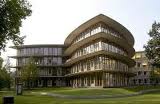
The third form of Dutch higher education (which has been offered for more than 50 years) are advanced courses taught in English in what is known as “international education” (IE). There are five large IE institutes and a number of smaller ones which all focus on development-oriented courses. These are based on working in small, intercultural groups and exchanging knowledge.
Teamwork, interactivity, and problem-based learning (emphasising self-study and self-discipline) are important elements of the Dutch education system. Admission and language requirements vary among institutions.
International Students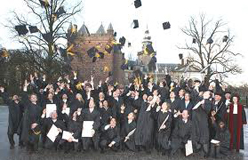
Though it is a non-English-speaking country, the Netherlands nevertheless offers most of its higher education programs and courses in English, with an emphasis on an international outlook. Dutch higher education institutions are known for being very high quality and for their student-centered approach.
Prospective international students should always check with the Netherlands embassy or consulate in their own country to ensure they have the most up-to-date information on visa/permit requirements and conditions. As issuing of visa applications can take three to six months, students must ensure they allow sufficient time for processing prior to their proposed date of commencement.
To enter the Netherlands for study purposes, most nationals except those from the EEA and several other specified countries, require a visa. There are different application procedures depending on nationality and length of stay. Students staying longer than three months may need to apply for a provisional residence permit. Students under the age of 18 will need parental/guardian permission. All international students must either produce evidence of multinational health coverage or take out health insurance while studying in the Netherlands. Cost of health insurance is €40–55 per month.
Regarding work in Holland, the Netherlands Organisation for International Cooperation in Higher Education notes the following:
“If you’re a foreign student (non–EU/EEA/Swiss) and you have a valid residence permit with the aim to study, you can work alongside your studies (either full-time seasonal work in June, July and August, or part-time work of no more than ten hours a week). In this case your Dutch employer does need a work permit for you, but this is an easy process as the employer doesn’t need to show that there are Dutch or EU nationals capable of doing the job. As an EU/EEA/Swiss student you are free to work as many hours as you like alongside your studies. Your employer doesn’t need to have a work permit for you.”